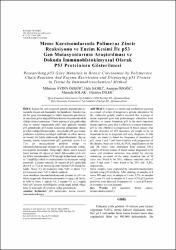Meme karsinomlarında polimeraz zincir reaksiyonu ve enzim kesimi ile p53 gen mutasyonlarının araştırılması ve dokuda immunohistokimyasal olarak p53 proteininin gösterilmesi
Abstract
Kanser bir seri progressif genetik değişiklikler sonucunda
oluşan çok basamaklı bir hastalıktır. Şimdiye kadar
bir grup protoonkogen ve tümör supressör gen üzerinde
meydana gelen değişikliklerin kanser oluşumunda etkili
olduğu ortaya konmuştur. Tümör supressör gen grubundan
olan ve kanser oluşumunda etkili olan genlerin başında
p53 gelmektedir. p53 meme kanserinin gelişiminde olduk-
ça etkili olduğu bilinmektedir, bu nedenle p53 gen mutasyonlarının
tespitinin hastalığın takibinde ve erken tanısında
önemli bir faktör olabileceği düşünülmektedir. Bu çalışmada,
meme kanserlerinde p53 genindeki ekson 5 ve
7’ye ait mutasyonların görülme sıklığı ve
immunohistokimyasal yöntem ile p53 proteininin varlığı-
nın tespitini amaçladık. Buna bağlı olarak meme kanseri
tanısı konmuş 20 olguya ait tümör dokusundan izole edilen
DNA örneklerinden PCR tekniği kullanılarak ekson 5
ve 7 amplifiye edildi ve enzim kesimi ile mutasyon varlığı
araştırıldı. Çalışma sonunda 20 olguya ait p53 genindeki
ekson 5 ve 7’ye ait mutasyon oranı toplam %30 olarak bulundu.
Ekson 5’e ait mutasyon oranı %20 ve ekson 7’ye
ait mutasyon oranı %11,8 olarak saptandı.
Aynı örneklere immunohistokimyasal yöntem ile p53 antikoru
uygulandı. Boyanma sonrasında 4 olguya ait örnekte
%90 ve üzeri, 1 olguda %3, 2 olguda %1 ve 2 olguda
%0,5 p53 protein pozitifliğinin varlığı tespit edildi. Olguların
11 tanesinde p53 protein varlığı gözlenmedi. Cancer is a multi-step mechanism occuring
as a result of series of progressive genetic alterations. So
far, molecular genetic studies revealed that a group of
tumor supressor gene and protooncogen alterations were
effective in cancer formation. p53 is the most important
tumor supressor gene that is effective in cancer formation.
p53 is very effective in progression of breast cancer. Due
to this, detection of p53 mutations are tought to be an
important factor in prognosis and early diagnosis. In this
study, we aimed to detect the frequency of mutations of
p53, exon 5 and 7 and their relations with progression of
the disease. Relevant to this, by PCR, amplification of 5th
and 7th exons were performed from isolated DNA
samples of tumor tissues of breast cancer diagnosed in 20
cases and mutation existence was tested by enzyme
restriction. As result of the study, mutation rate of 20
cases was found to be 30%, whereas mutation rates of
exon 5 and exon 7 were found to be 20% and 11,8%,
respectively.
Same samples were evaluated by immunohistochemistry
method using p53 antibody. After staining, in samples of 4
cases 90% and over; in sample of 1 case 3,2%; in samples
of 2 cases 1% and in samples of 2 cases 0,5% p53 protein
positivity were detected. In samples of 11 cases p53 protein
existence was not detected.
Source
Afyon Kocatepe Üniversitesi, Kocatepe Tıp DergisiVolume
7Issue
1Collections
- Makaleler [452]



















